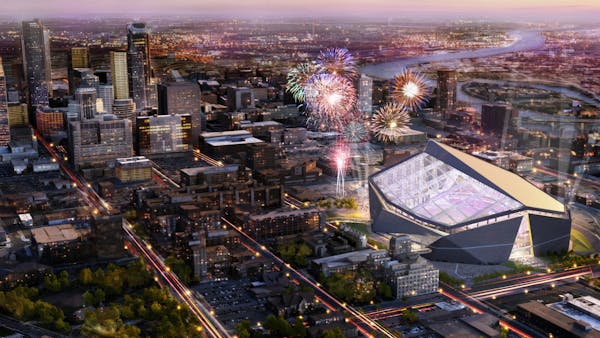Four months removed from the glow of Major League Baseball's All-Star Game, the economic benefits that the event was supposed to bring to Minnesota appear to have shrunk.
Meet Minneapolis, the city's tourism arm, had initially predicted the game would mean a $75 million boost for the local economy, but based on closer study has now revised the figure to $50 million. The state Department of Revenue, reviewing sales tax data for Minneapolis, added that the true figure could be as high as $55 million, or as low as $21 million.
Measuring the economic impact of signature sporting events like the Super Bowl and All-Star Game has always been an inexact science. For their analysis, state officials examined sales taxes that are charged on most goods and services, ranging from restaurant food to admission to sporting events to lodging and parking.
The All-Star Game's financial boost to the local economy takes on added relevance this week as Minneapolis awaits Friday's announcement on whether college basketball's Final Four tournament will soon be played at the Minnesota Vikings' new $1 billion stadium. Boosters of the event have said it will provide a noticeable economic impact. Jennifer Hathaway of the Minnesota Sports Facilities Authority said the economic impact for other Final Four host communities the past four years has ranged from $70 million to $200 million.
When Major League Baseball Commissioner Bud Selig announced in August 2012 that the All-Star Game was coming to Minnesota in 2014, one downtown Minneapolis civic leader predicted that the game could ultimately mean $110 million in economic benefit.
Since the game took place, neither Major League Baseball nor the Minnesota Twins has studied the extent of the local impact.
But Kevin Hanstad, Meet Minneapolis' director of market research, has crunched some numbers. It was Hanstad's $75 million figure that Selig used at his news conference.
"At the time, it seemed believable to me," Hanstad said of his original projection. Hanstad said he based his forecast in part on the estimated $60 million that the All-Star Game brought to Kansas City and St. Louis, though he added that those estimates were "loosey-goosey."
He said the actual number for Minneapolis is likely closer to $50 million, and added that even that number remains uncertain. Hanstad said he has the most confidence in just one statistic — that the game itself, played on a Tuesday night, generated $26.9 million in economic benefit.
"It looks like there's something there, right? But what is it?" said state Revenue Commissioner Myron Frans, who said it is difficult to separate any boost from the All-Star Game from the general upswing that Minneapolis' economy has seen since 2010. "You don't want to overstate the case."
At Meet Minneapolis, new research has provided a more detailed breakdown of the All-Star Game and the activities that accompanied it. While the game itself led to $26.9 million in economic impact — and supported 6,500 jobs — the 114,900 people who attended the All-Star Fan Fest at the Minneapolis Convention Center generated $9.1 million in economic activity, and the Pepsi-sponsored block party produced another $3.1 million.
Hanstad said many of the figures, though based on complicated calculations, remain estimates. Even the estimates, especially for events other than the game, have flaws.
"I don't know if the visitors went to one of [the events], or all of them," he said.
For some, the All-Star Game and surrounding events add up to an economic home run. Kimberly Zoulek, director of sales and marketing at the Hilton Minneapolis hotel, said Major League Baseball designated the hotel as its headquarters and booked 700 of the hotel's 821 rooms on the busiest night. "It really put Minneapolis, as a destination, on the map," she said.
The All-Star Game was very good for all the 28 hotels located in downtown Minneapolis.
Average room rates for the hotels on Sunday, two days before the July 15 game, jumped from $139 to $242 from the year before. Room occupancy for the hotels also increased from the year before, from 53 to 87 percent capacity on the Sunday before the game.
Other statistics, however, showed less of an impact.
Monthly sales taxes in Minneapolis for July were 9.2 percent higher than for the same month a year before, a percentage that state revenue officials said roughly translated to a $55 million increase in taxable sales.
But largely because of a rebounding economy, Minneapolis' monthly percentage for July had been steadily rising since at least 2011. State revenue officials said that after factoring for the increases already occurring, July 2014 showed a boost of $21.3 million in taxable sales that might be attributable to the game and its surrounding activities.
The statistics show that the All-Star Game's wider impact may be even more difficult to measure, and may have been negligible.
Sales tax increases for July in Hennepin County and St. Paul, for example, showed no noticeable uptick.
State revenue officials said this year's July boost in Minneapolis' sales taxes could in the end be due to baseball — but not necessarily the All-Star Game. Officials pointed out that the Twins played 16 home games at Target Field in July, compared with nine in July 2013.
Mark Becker, general manager of the 645-room Hyatt Regency Hotel in downtown Minneapolis, said it was all worthwhile. The hotel provided 450 rooms to Major League Baseball, including rooms for the players.
Becker said that "sports, in general, continue to support tourism in a real meaningful way."
Mike Kaszuba • 612-673-4388
Victim in north Minneapolis shooting identified as man from Chicago

This St. Paul native now goes by Kandi Krush, and she body-slams her opponents in the ring

Baseball Metro Player of the Year packs up his five tools and leaves

